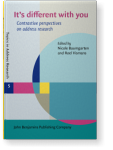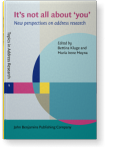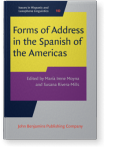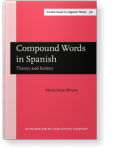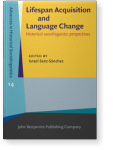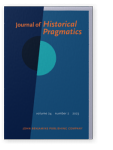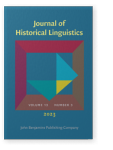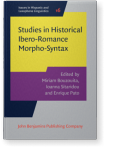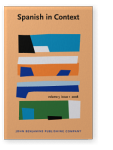María Irene Moyna
List of John Benjamins publications for which María Irene Moyna plays a role.
Book series
Titles
It’s not all about you: New perspectives on address research
Edited by Bettina Kluge and María Irene Moyna
[Topics in Address Research, 1] 2019. vi, 447 pp.
Subjects Discourse studies | Pragmatics | Sociolinguistics and Dialectology
Forms of Address in the Spanish of the Americas
Edited by María Irene Moyna and Susana Rivera-Mills
[Issues in Hispanic and Lusophone Linguistics, 10] 2016. x, 352 pp.
Subjects Morphology | Pragmatics | Romance linguistics | Sociolinguistics and Dialectology
Compound Words in Spanish: Theory and history
María Irene Moyna
[Current Issues in Linguistic Theory, 316] 2011. xxv, 451 pp.
Subjects Historical linguistics | Romance linguistics | Theoretical linguistics
2024 Chapter 7. Tracing the emergence of the voseo/tuteo semantic split in Río de la Plata second person subjunctives: The role of child language acquisition Lifespan Acquisition and Language Change: Historical sociolinguistic perspectives, Sanz-Sánchez, Israel (ed.), pp. 150–178 | Chapter
This study documents the history of second person singular informal variation in Rioplatense Spanish. It focuses on the competition between voseo and tuteo forms in the subjunctive and proposes that the outcome of this variation can be linked to the acquisition of these forms by children. In… read more
2023 Story, style, and structure: The second person in early Uruguayan children’s literature Journal of Historical Pragmatics 24:2, pp. 217–244 | Article
This study analyses variation and change in Uruguayan Spanish address between formal (usted) and informal variants (tú, vos). It focusses on address representations in children’s literature written between 1918 and 1973 – foundational texts that helped consolidate national identity. Our study… read more
2023 Children as agents of language change: Diachronic evidence from Latin American Spanish phonology Journal of Historical Linguistics 13:3, pp. 327–374 | Article
This paper explores the operation of child language acquisition as a critical factor in some forms of language change. It proposes a sociohistorical model that incorporates the potential for young children to function as linguistic agents in certain environments, characterized by unpredictable… read more
2019 Variation in polite address in contemporary Uruguayan Spanish It’s not all about you: New perspectives on address research, Kluge, Bettina and María Irene Moyna (eds.), pp. 191–220 | Chapter
This chapter explores formal address pronoun usted in Uruguayan Spanish (USp), by ascertaining the extent of its use and the influence of social and pragmatic variables. The study is based on a questionnaire that included situations of social distance or power difference (n = 579). For each… read more
2019 Address and address research: Here’s looking at you, kid It’s not all about you: New perspectives on address research, Kluge, Bettina and María Irene Moyna (eds.), pp. 1–20 | Introduction
2018 Chapter 3. The history of concatenative compounds in Spanish Studies in Historical Ibero-Romance Morpho-Syntax, Bouzouita, Miriam, Ioanna Sitaridou and Enrique Pato (eds.), pp. 47–74 | Chapter
This article analyses Spanish concatenative compounds, whose constituents are of the same lexical category and structural hierarchy (e.g., rojinegro ‘red-black’), focusing in particular on the evolution of their formal features. The first issue considered is the relative frequency of various… read more
2016 Introduction: Addressing the research questions Forms of Address in the Spanish of the Americas, Moyna, María Irene and Susana Rivera-Mills (eds.), pp. 1–12 | Article
2015 “Is that what I sound like when I speak?”: Attitudes towards Spanish, English, and code-switching in two Texas border towns Spanish in Context 12:2, pp. 177–198 | Article
This study investigates language attitudes towards English, Spanish and code-switching in two Texas border cities (Laredo and Edinburg) by means of a matched guise test with three attribute dimensions (solidarity, status, and personal appeal). It was found that there were no significant overall… read more
2008 Representaciones dramáticas de una variable lingüística: Tuteo y voseo en obras de teatro del Río de la Plata (1886–1911) Spanish in Context 5:1, pp. 64–88 | Article
El presente estudio es un análisis cuantitativo de las representaciones teatrales del tratamiento de segunda persona del singular en el español del Río de la Plata a comienzos del siglo XX. Se basa en dieciocho obras de teatro escritas entre 1886 y 1911, en cada una de las cuales se contabilizaron… read more
